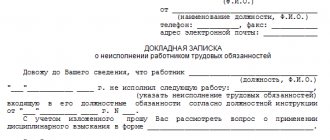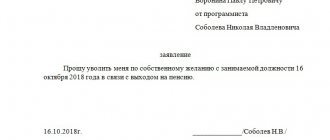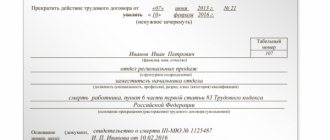13.06.2019
0
57
5 minutes.
If an employee does not fulfill his job duties or violates the order, management has the right to impose various disciplinary sanctions on the employee. One of the most common types of sanctions is a reprimand. Since it can be recorded in the work book, the parties should formulate it as carefully as possible in order to avoid subsequent disputes. Below we will consider whether a reprimand is entered into the work book, and what the consequences may be for the employee.
Decor
A reprimand is usually formatted as follows:
- conduct an official investigation;
- they take an explanation from the guilty employee;
- issue an order indicating the type of disciplinary punishment.
In fact, these are the only official documents that reflect a reprimand against the employee.
The personnel officer can also make a corresponding note in the employee’s personal card form T-2 (there is no special column in the form). The fact that this or that disciplinary punishment was imposed on this employee.
As a rule, this is done because in some organizations the imposition of a reprimand/reprimand entails a consequence such as deprivation/cut of bonus. And since the effect of the reprimand lasts a whole year, so that when issuing an order for a bonus they do not forget to exclude this employee, they make such a note.
Also, information about the imposition of disciplinary punishment must be on hand if the employee commits a repeated offense within a year after the reprimand.
Video
Formalities related to issuing a reprimand
If a disciplinary violation is detected, the employer must take a detailed explanatory note from the employee outlining his version of what happened. If the employee refuses to write an explanation, the administration writes a report. An employee’s refusal to explain his violations in writing is not an obstacle to disciplinary action.
The employer must familiarize the employee with the order (instruction or resolution) on disciplinary punishment against signature and no later than three days from the date of issue of the document.
In the absence of these actions by the employer, the violator of discipline can challenge the punishment within three months. The employee can appeal to the court or labor protection authorities.
Issuing an order
After all the necessary materials have been collected, the manager is obliged to study them in detail and make a decision. To do this, you need to draw up and approve an order with the appropriate content. It is such a document that will be the basis for issuing a reprimand.
The order is drawn up using ordinary office paper or a printed form.
The text must reflect:
- Full company name.
- Date and registration number of the document.
- Information about the offender.
- The circumstances of the offense.
- The measure of influence that will be applied to the employee. In this case it is a reprimand.
- Manager's signature.
The worker must be familiarized with the order within three working days from the date of its approval. Refusal to familiarize yourself with the document is documented.
Order
The procedure for imposing a reprimand on an employee is clearly regulated by Articles 192 – 195 of the Labor Code of the Russian Federation. Deviation from it may result in the employee appealing the imposed punishment. And if the procedure is not followed, the reprimand from the employee will be removed even if he is at fault.
After the reprimand expires, the employee is considered not to have been subject to disciplinary sanctions.
Keep in mind: all this does not imply entering a reprimand into the employee’s work record book.
It reflects slightly different information.
Are there time limits for disciplinary action?
The fact of such collection is regulated by Article 193 of the Labor Code of the Russian Federation.
It indicates the possibility of applying such a measure no later than within a month from the date of the violation.
The duration of an employee's illness or vacation is not taken into account in this calculation. Adopted based on the results of inspections, such a measure cannot be imposed within a period of more than 6 months from the date of commission.
Separately, the imposition of a penalty based on the results of an administrative and economic audit is taken into account. In such a situation, the period is extended to 2 years.
Upon detection, a collection order is issued, which must be personally endorsed by the employee within 3 days after signing.
What information is included in the labor report?
A work book is one of the main documents of an employee. It reflects the following information:
- surname, name, patronymic of the employee;
- date of his birth;
- education;
- work experience, including information about all places of work, positions, transfers and dismissals.
This is indicated in the current rules for maintaining a work book. There is also a direct ban on entering other information into the work book.
When an employee is fired under an article, then in this case such disciplinary punishment can and should be entered into the work book.
Thus, the answer to the question - is a reprimand entered into the work book - is clearly negative.
Also see “Rules for filling out work books in 2021.”
Dismissal
You can't just fire an employee. The grounds for termination of an employment contract at the request of the employer are clearly listed in Art. 81 Labor Code of the Russian Federation:
- the employee has not passed the certification;
- absenteeism (absent from work for more than 4 hours in a row);
- came drunk, under the influence of drugs or other illegal drugs;
- grossly violated official duties;
- received disciplinary punishment and still did not do the work;
- disclosed commercial (state, official) secrets;
- stole and damaged the property of the organization or colleagues and was sentenced by the court to liability;
- violated labor protection and caused an accident or knowingly created such a threat;
- committed guilty actions related to material values and lost trust;
- did not submit a certificate of income or provided false information (for civil servants under the Law of July 27, 2004 No. 79-FZ “On the State Civil Service...”);
- committed an immoral act (for educational workers);
- made an unreasonable decision that led to damage to the organization’s property (for directors, deputies and chief accountants);
- When applying for a job, he brought false documents.
In addition, when the owner changes, the new owner can appoint his own director, deputy and chief accountant. And when an enterprise is liquidated or its workforce is reduced, the employees are first offered another job. And, if they refused in writing, you can fire them under Art. 74 Labor Code of the Russian Federation.
It is impossible to dismiss an employee on sick leave or on vacation, except in cases of liquidation of the enterprise or termination of activities by an individual entrepreneur.
Punishing an employee: step-by-step instructions
The procedure for applying disciplinary sanctions is set out in Art. 193 Labor Code of the Russian Federation. Let's look at the procedure using a specific example.
Example 2
Lyudmila, a cloakroom attendant at a medical center, left her workplace without warning. As a result, patients were unable to return clothing and were late for appointments. The misconduct was discovered by a senior nurse who received a complaint from citizens. She wrote a report, and now we have to issue a disciplinary punishment.
We draw up an act
The time of the woman’s absence can be confirmed by security guards at the exit of the building, video recording from a surveillance camera, testimony of witnesses, etc.
Having made sure that the cloakroom attendant is not present, the head of the department (the immediate superior of the violator) will draw up an act of misconduct indicating the place, time and circumstances of the employee’s absence. He will sign it himself and ask for the signatures of witnesses confirming the contents of the document.
We ask for an explanation from the employee
Before punishing, you need to find out the reasons for what happened. Perhaps the person has serious circumstances. For example, it became bad and he ran out into the street and fainted. The arguments of the culprit are very important; based on them, the type of punishment will be determined.
When Lyudmila appears, she will be given an act (for signature) and asked to give the reasons for her actions on paper in any form within 2 days. If she does not bring an explanation on time, it is possible to punish her without it. But you will have to draw up another act in the presence of at least two witnesses.
We issue an order to impose a disciplinary sanction
In our case, the employee left the place for 4 hours - this is absenteeism. He refused to give an explanation and did not give any valid reasons. You can fire Lyudmila - Art. 81 of the Labor Code of the Russian Federation allows. But the chief doctor took pity on her and reprimanded her.
It is impossible to delay with the order; disciplinary action is applied no later than a month from the date of discovery of the offense, and not its commission. But in our case, absenteeism was discovered on the same day (July 7), which means that the employee must be punished before August 7. In a month it will be too late, because Art. 193 of the Labor Code of the Russian Federation clearly limits the time.
The violator must be familiarized with the order within 3 working days from the date of issue, not counting the time of absence (illness, business trip, shift change, vacation, etc.). If the culprit refuses to sign the order, then it is necessary to draw up a report about this.
You can also remove a reprimand or reprimand early. Both the employee himself and his immediate superior or trade union have the right to appeal disciplinary liability. A statement or memo is drawn up, and if the employer agrees to cancel the order, then a corresponding order is issued.
Upon dismissal, an order is drawn up and an entry is made in the work book. Earned money is paid on the day from which the employee is dismissed. You cannot deprive your salary or part of it. An exception may be cases when a financially responsible person has appropriated or damaged the company’s assets.
Where can you report information about disciplinary punishment?
When an employee is reprimanded, first of all, it is reflected in the order about it. Labor legislation does not regulate further dissemination of information about the reprimand. But the paperwork has developed in such a way that a reprimand may appear in the following documents:
| Document | Explanation |
| As was said - in a personal card in the T-2 form | There is no separate line here for information about disciplinary action, but you can add this in section 10 “Additional information” |
| You can attach a copy of the order to your personal file, which includes the T-2 card | Therefore, information about the reprimand is entered either on the card or in the personal file. |
| The reprimand can be reflected in the employee’s characteristics | For example, when an employee leaves the company and asks for a reference for another job. But in this case, you should remember: if a year has passed since the imposition of the reprimand. this reprimand should be considered invalid. |
| You can enter information about the reprimand in the order on the results of work for the year or quarter | This is done to resolve the issue of bonuses for this employee. |
What is meant by the concept of “disciplinary action”?
This measure is taken against an employee who has violated labor discipline. This means improper performance or failure to fulfill labor duties. Disciplinary liability implies the adoption of measures provided for by the provisions of labor law. And such responsibility refers to the types of legal responsibility.
Types of such penalties
In accordance with Labor legislation, an employer can currently use in relation to an employee:
- making an official comment;
- reprimand or severe reprimand;
- dismissal or termination of an employment contract.
Can also be used:
- warning the employee about his inadequacy for the position held;
- dismissal from a position.
If you include a reprimand in your work book
Sometimes the employer puts a reprimand in the work book on principle. As a rule, this is done in the section intended for information about incentives and awards.
In this case, the employee has the right to demand that this entry be removed. If the employer does not agree, you can contact the relevant authorities:
- to the labor inspectorate;
- prosecutor's office
The employer will be given an order to bring the work record book into proper form. Therefore, entering a reprimand in the work record book may have negative consequences for the company in the form of a fine and other sanctions.
Also see “Gratitude in the work book: sample and what it gives.”
Possible reasons
Many employers do not know in what cases such a penalty can be issued. The most popular serious circumstances for issuing a reprimand include:
- being drunk at work;
- the employee’s refusal to undergo a medical sobriety examination;
- absence of an employee during a safety exam;
- absence of a person from his workplace.
There are also less serious circumstances for which a reprimand can also be given, but without entering it into the employee’s record book:
- insult or disrespect towards an official;
- use of force against officials;
- other less serious circumstances.
In addition to disciplinary liability, financial or civil liability may arise. Everything will depend directly on the offense committed and the severity of the consequences that occurred. You can learn more about this from the video presented.
conclusions
Based on the information presented, the following conclusions can be drawn:
- It is prohibited to enter information about a reprimand into the employee’s work book;
- the only document where the presence of information about a reprimand is legally permitted is an order;
- information about the reprimand can be included in those documents where this is not prohibited by labor legislation;
- the only type of disciplinary punishment that can be mentioned in the work book is dismissal.
Also see “Entry in the work book about dismissal in 2021.”
Read also
31.08.2017
What to consider when issuing a reprimand
When filing a recovery, the circumstances of the incident are studied:
- prerequisites in the work process (equipment malfunction or update);
- conflicts in the team or with superiors;
- standard working hours and additional workload;
- employee's well-being.
IMPORTANT! The reprimand is appealed to the state supervisory authorities. Any deviation from the paperwork procedure or unreasonableness of actions will serve as a reason for its cancellation.
All factors contributing to the incident, the explanatory note and the testimony of witnesses are studied. Based on this, the type of punishment and legality are determined.
Concept of reprimand
Any disciplinary offenses by employees entail liability for the guilty person. Holding accountable is the right of the employer, which he can use to ensure that all his employees comply with the discipline established at the enterprise and take their obligations responsibly.
In itself, disciplinary action implies holding a person accountable for committing any offenses, or for poor performance of his obligations. One form of such punishment is a reprimand.
If the employer decides to take disciplinary action, he is obliged to comply with the established norms of the Labor Code, as well as adhere to ethical rules of conduct.
Removal
The total period of validity of a disciplinary sanction is no more than one year from the date of its issuance. The situation with this type of penalty such as dismissal is no exception - it is subject to general rules, as well as other types of penalties.
However, the employer can use this opportunity only in relation to the employee who continues to be on his staff and perform his duties in relation to such an employer. If the employee was dismissed, then the removal of the penalty against him becomes impossible, except after its expiration, that is, one year after the issuance.
In the event that we are talking about identifying an offense after a certain time has passed since the commission of such an offense, then it should be taken into account that a penalty can be imposed only until the expiration of a period of three months from the date of commission of such an offense . Otherwise, the penalty itself will be considered unlawful, and its removal will become a useless and meaningless action.
However, it should be taken into account that the employer who discovered the misconduct does not have the right to contact the new employer, since when changing places of work, the employer’s rights to impose a penalty on its resigned employee are completely lost. The only option for bringing to justice is to go to court on the basis of existing documents about misconduct.
Dear readers, each case is individual. If you want to find out how to solve your particular problem, call :
Or on the website. It's fast and free!
Obtaining explanations from the employee who committed the violation
Before issuing an order to apply a disciplinary sanction, a written explanation must be requested from the employee (Article 193 of the Labor Code of the Russian Federation). Thus, the employee is given the opportunity to indicate valid reasons for his misconduct. The Labor Code of the Russian Federation does not specify in what form the employer must request this explanation. Therefore, if the employee is ready to submit an explanatory note, a written request need not be issued. If the situation is clearly of a conflict nature, then it is better to formalize this requirement in writing and hand it to the employee against signature. If the employee refuses to sign the request, it is necessary to draw up a corresponding act.
The Labor Code of the Russian Federation allows the employee two working days to provide explanations, which are counted from the date following the day the demand is presented. If after this period the employee has not provided an explanation, then a corresponding act is drawn up (Article 193 of the Labor Code of the Russian Federation). If there is such an act and a document indicating that an explanation was requested from the employee, a disciplinary sanction can be applied without an explanatory note from the employee (Article 193 of the Labor Code of the Russian Federation).
Situation from practice
When is it necessary to draw up a report stating that an employee has not provided an explanation for a violation of discipline?
An act of refusal to give explanations must be drawn up after two working days from the date of presentation of the corresponding demand to the employee.
According to Art. 193 of the Labor Code of the Russian Federation, an act stating that the employee did not provide an explanation for the fact of the violation of discipline is drawn up after two working days from the date of presentation of this requirement. Accordingly, if the claim is submitted on Monday, then the first day will be Tuesday, and the second will be Wednesday. In this case, due to the specified norm, the second day must expire. Thus, if no explanations have been received by 24 hours on Wednesday, then on Thursday, a corresponding act can be drawn up. If the employee submits an explanatory note, the employer’s further actions depend on the reasons for the misconduct indicated in it. If the employer considers them to be valid, then no disciplinary action will be taken. Otherwise, the explanatory note becomes one of the grounds for applying a reprimand or reprimand.
Is it possible to challenge a reprimand?
Any employee, if he disagrees with the manager’s decision, can appeal the latter’s actions. To cancel an approved order, the interested person must contact the authorized official bodies.
It would be correct to first send the application to the labor dispute commission. CTS is created in almost every enterprise. Its competence includes, among other things, resolving issues of this nature. If this does not give the desired result, then you can send a complaint to the labor inspectorate.
In turn, going to court is a last resort, but can give more guarantees to a person in a positive solution to his problem.
The period for contacting these organizations is three months from the moment the employee became aware or could have learned of a violation of his rights. This period can be restored if time is missed for valid reasons.
Rules for making comments to employees
A remark addressed to an employee is one of the alternatives to a reprimand.
To apply such a punishment, you need to perform several actions:
- Preparation of a memo describing the comment.
- Requirement for explanations from violators.
- Drawing up an order confirming the punishment.
- Presentation of the order to the employee against signature.
Compared to reprimands, remarks as a type of punishment are more loyal. The absence of repeated violations here also means automatic cancellation of old ones. Early removal of penalties at the initiative of one of the parties is permissible.











